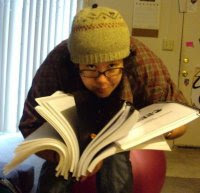Today in the grad only meeting of Women't Lit class we started discussing Linda Hutcheon's Theory of Adaptation. In the course of this discussion we read where Hutcheon states that "sequels and prequels are not really adaptations...nor is fan fiction" (9). I found this comment somewhat bewildering. Although I realize that in some ways the three excluded modes do not substantially depart from the "original" or "adapted work", I think that they do fit the three primary criterion Hutcheon establishes earlier in the text (8). Furthermore I think that it might be interesting to pay some attention to the rather recent phenomenon of creating print spin-offs of film and television productions. For me this shift in media strongly suggests adaptation.
I mentioned this in class by specifically referencing CSI which began as one television program, and is now three television programs which have been the source for a number of paperback novels, magazines, video games, board games etc... This topic brought us all rather quickly to the issue of commodification. Since CSI is a television show produced to make money (not "art") how does this effect the idea of the CSI novel as adaptation? Are the novels:
1) Not adaptations because they are part of a moneymaking franchisee phenomenon?
2) Not adaptations because they are like prequels, sequels and fan fiction?
3) Cross media adaptations which meet the three major criterion set out by Hutcheon regardless of her later caveat and the market forces behind CSI?
I'm voting three. There is no real point in arguing high culture v. low culture since all modes of communication and literature can be valuable sources of information, the study of which can provide the scholar with critical insights. Furthermore regardless of whether it is Dean Koontz or Edith Wharton or the Bible for that matter, market forces play a role in the availability and production of texts.
Our little group briefly talked about how the idea of dialogue separate from commodification might benefit entry level academics (i.e. freshmen). Although I can imagine the value of such a worldview, where learning and texts are cherished and explored for no real "market" reason, I have a difficult time envisioning this. If everything is subject to the market in our time and place, then what dialogue is there that is not impinged by the market?
I like to think that I do what I do because I love literature. Ultimately this is probably about 85% true. Somewhere in there you can add in egotism and money, then you'd have a fuller picture.
Today my summer term partially ended.
Tomorrow more Pendleton.


3 comments:
I agree and go with 3! Question?
Do you think that actors condisder
thier work as art?
When you get down to it it all comes down to the $$$$$.
Luv A
I agree and go with 3! Question?
Do you think that actors condisder
thier work as art?
When you get down to it it all comes down to the $$$$$.
Luv A
sorry I hit the publish botton twice!
Post a Comment